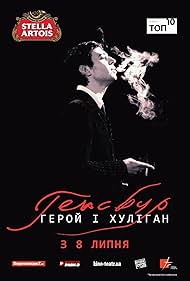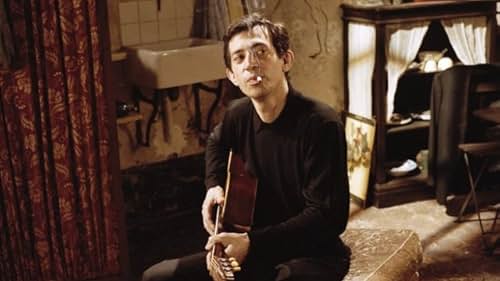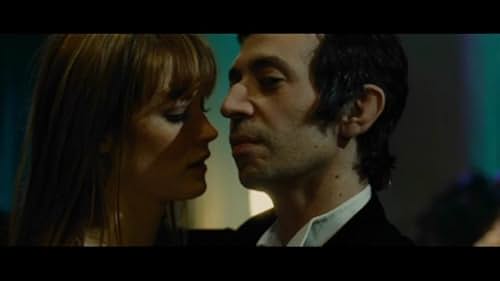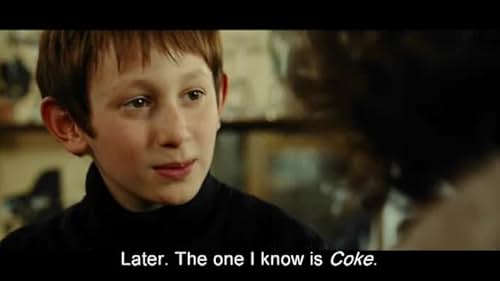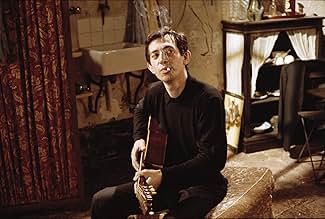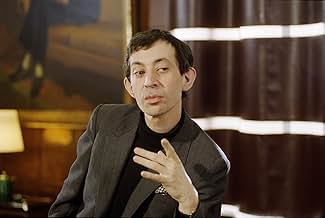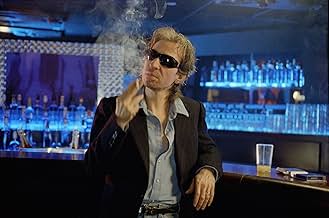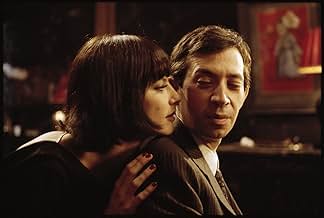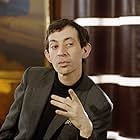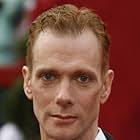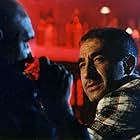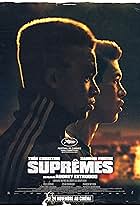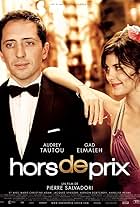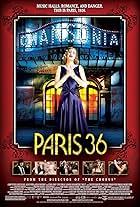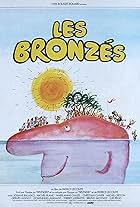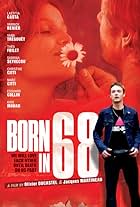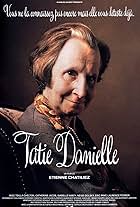IMDb RATING
6.9/10
10K
YOUR RATING
A glimpse at the life of French singer Serge Gainsbourg, from growing up in 1940s Nazi-occupied Paris through his successful song-writing years in the 1960s to his death in 1991 at the age o... Read allA glimpse at the life of French singer Serge Gainsbourg, from growing up in 1940s Nazi-occupied Paris through his successful song-writing years in the 1960s to his death in 1991 at the age of 62.A glimpse at the life of French singer Serge Gainsbourg, from growing up in 1940s Nazi-occupied Paris through his successful song-writing years in the 1960s to his death in 1991 at the age of 62.
- Awards
- 7 wins & 9 nominations
Dinara Drukarova
- Olga Ginsburg (la mère)
- (as Dinara Droukarova)
Storyline
Did you know
- TriviaThe project was originally envisioned with Serge Gainsbourg's real life daughter, actress Charlotte Gainsbourg to play him in keeping with the film's surreal and fairytale-esque tone. Six months into rehearsals and preparation Gainsbourg pulled out telling director Joann Sfar, it was proving too emotionally painful and he would have to make his "beautiful film" without her. Sfar had always approached the film with her in mind and was ready to abort the project when fate lead him to Eric Elmosnino.
- GoofsThe young Gainsbourg is shown drawing left-handed, but the adult Gainsbourg becomes right-handed.
- Quotes
Serge Gainsbourg: [after a man tips him while he plays the piano] What are you fucking kidding me? I'm not a jukebox!
- Crazy credits"Pour Lucy" i.e. this was Lucy Gordon 's last film.
- Alternate versionsEngland is the first territory to release a new cut of the film, running 14 minutes shorter than the previous version and is Joann Sfar's preferred one. Changes include -
- Deletion of the scene where young Serge pleads in vain for his mother to buy him a gun to play with, even attempting to bribe her by saying he'll work harder on the piano. This precedes the scene where he steals the gun from the shop.
- Deletion of the scene where Serge and Boris Vian walk to his apartment and the two lie in the road in an effort to stop a cab. While they wait Serge reveals he has a double that follows him around to which Vian replies his is a werewolf. However two policemen soon cut the conversation short. (This precedes Serge arriving at Boris's apartment and explains a later scene where a drunken Serge lies in the road before having the police escort to his concert)
- Longer scene of the "Baby Pop" groupies, as Gainsbourg wakes up in bed with two naked women as his Mug joyously tosses bank statements at him revealing how rich he is from "Poupée de cire, poupée de son" alone! This is the original lead in to "Qui Est In Qui Est Out".
- The groupies and party to "Qui Est In Qui Est Out" is cut short, removing Serge narrating about "the mouth being the primary sexual organ". His narration reveals the girls in the room he has slept with and how he was with them. It reveals Gainsbourg's occasional cruel streak and precedes the angry neighbor banging on the door.
- After Gainsbourg recites La Marseillaise at the press conference, we then see young Serge repeating it and triumphantly raising his fist to the audience.
- Deletion of a short exchange in the nightclub when a reveller comments to Gainsbourg about him being parodied on a French TV show. The new version removes these lines either because the show is unknown outside of France or because it doesn't tie in as being the night Gainsbourg met his wife Bambou as that TV show wouldn't air until years later. Sfar has said this new version will be the one further released worldwide.
- ConnectionsFeatured in De wereld draait door: Episode #5.128 (2010)
Featured review
Lucien 'Serge Gainsbourg' Ginsburg. Artist. Writer. Performer. Alcoholic. Smoker. Rebel. Womanizer. Genius? Joann Sfar's film documents the sporadic lifestyle of the famous French artist Serge Gainsbourg (Eric Elmosnino), whose life contained no boundaries, no objects off limit, and continually tested the patience of those huddled together around him. Beginning with a young Gainsbourg developing his taste for painting aspiring models in Nazi-Occupied France as a mere teenager, the film thereupon concentrates primarily upon his relationships with various beautiful women and his life choices in regards to his ever-changing occupation over his sixty-year-life-span.
What makes this film work so well as a biopic is the truly ingenious performances by both Kacey Mottet Klein (Young Gainsbourg) and Eric Elmosnino (Adult Gainsbourg) who both somewhat beautifully represent such a tragic figure throughout his whole on-screen lifetime. Kacey portrays Gainsbourg as a boy who is maturing faster than those other children around him, so far so, that he explains to one of the schoolchildren the reason that he is good at drawing pubic hairs is because he has had an up-close and personal experience with them before. While he is also shown to be a lonely child, an outcast as Jewish child growing up in Nazi-Occupied France, and thus he develops an affable 'imaginary friend' to keep himself company. Born as small, soft head that watches over young Gainsbourg as he sleeps in the woods to avoid the Nazi soldiers, his only friend soon becomes his worst enemy as he matures into a complicated man. His once pleasant 'imaginary friend' is now a grotesque being with a large nose, long-thin fingers and an affection for cigarettes and bullying Gainsbourg. He continually berates insults, prods and engages Serge, providing the viewpoint that he himself was his harshest critic, and a critic he could not simply dismiss without entire control over his life.
Aside from the performances, the way Sfar allows the films narrative to flow in a temporal manner with no mention of time, or calendar dates, further draws the audience in to Gainsbourg's contrived world. The only way to tell when an event shifts forward in his lifetime, is through his own physical deterioration from old age which is heavily dictated by his excessive abuse of alcohol and tobacco. But as Gainsbourg becomes older, his sexual conquests stay the same age; from Elisabeth (Deborah Grall), to Jane (the late Lucy Gordon), and to an affair with the insatiable Brigitte Bardot (Laetitia Casta), before he eventually settles down with Bambou (Mylene Jampanoi), who would be his final partner. These are all young, vulnerable women who Gainsbourg exploits for his own sexual misgivings, and once they become too old, or too boring, he discards them like a child throwing away an old toy to badger his parents for a new, more expensive model.
Joann Sfar beautifully flowing biopic paints Serge Gainsbourg as a shallow, misogynistic, grumpy old man, who once had dreams of becoming famous for doing anything, but once those dreams were realised, greed and narcissism triumphed over his once forgotten ambitions. Utilizing his gift for writing, artistry and music Gainsbourg chose the route of controversy and scandal over that of happiness and family, which is exemplified in his response to the media after he had a heart attack. When the reporters asked what he will be doing now after such a dangerous and life threatening operation, Gainsbourg calmly asserted to those in attendance that he will "continue to smoke many more cigarettes and drink much more alcohol."
What makes this film work so well as a biopic is the truly ingenious performances by both Kacey Mottet Klein (Young Gainsbourg) and Eric Elmosnino (Adult Gainsbourg) who both somewhat beautifully represent such a tragic figure throughout his whole on-screen lifetime. Kacey portrays Gainsbourg as a boy who is maturing faster than those other children around him, so far so, that he explains to one of the schoolchildren the reason that he is good at drawing pubic hairs is because he has had an up-close and personal experience with them before. While he is also shown to be a lonely child, an outcast as Jewish child growing up in Nazi-Occupied France, and thus he develops an affable 'imaginary friend' to keep himself company. Born as small, soft head that watches over young Gainsbourg as he sleeps in the woods to avoid the Nazi soldiers, his only friend soon becomes his worst enemy as he matures into a complicated man. His once pleasant 'imaginary friend' is now a grotesque being with a large nose, long-thin fingers and an affection for cigarettes and bullying Gainsbourg. He continually berates insults, prods and engages Serge, providing the viewpoint that he himself was his harshest critic, and a critic he could not simply dismiss without entire control over his life.
Aside from the performances, the way Sfar allows the films narrative to flow in a temporal manner with no mention of time, or calendar dates, further draws the audience in to Gainsbourg's contrived world. The only way to tell when an event shifts forward in his lifetime, is through his own physical deterioration from old age which is heavily dictated by his excessive abuse of alcohol and tobacco. But as Gainsbourg becomes older, his sexual conquests stay the same age; from Elisabeth (Deborah Grall), to Jane (the late Lucy Gordon), and to an affair with the insatiable Brigitte Bardot (Laetitia Casta), before he eventually settles down with Bambou (Mylene Jampanoi), who would be his final partner. These are all young, vulnerable women who Gainsbourg exploits for his own sexual misgivings, and once they become too old, or too boring, he discards them like a child throwing away an old toy to badger his parents for a new, more expensive model.
Joann Sfar beautifully flowing biopic paints Serge Gainsbourg as a shallow, misogynistic, grumpy old man, who once had dreams of becoming famous for doing anything, but once those dreams were realised, greed and narcissism triumphed over his once forgotten ambitions. Utilizing his gift for writing, artistry and music Gainsbourg chose the route of controversy and scandal over that of happiness and family, which is exemplified in his response to the media after he had a heart attack. When the reporters asked what he will be doing now after such a dangerous and life threatening operation, Gainsbourg calmly asserted to those in attendance that he will "continue to smoke many more cigarettes and drink much more alcohol."
- the_rattlesnake25
- Aug 5, 2010
- Permalink
Details
- Release date
- Country of origin
- Official sites
- Languages
- Also known as
- Gainsbourg
- Filming locations
- Rue de Verneuil, Paris 6, Paris, France(Gainsbourg's house)
- Production companies
- See more company credits at IMDbPro
Box office
- Budget
- €11,500,000 (estimated)
- Gross US & Canada
- $233,007
- Opening weekend US & Canada
- $25,189
- Sep 4, 2011
- Gross worldwide
- $12,220,456
- Runtime2 hours 15 minutes
- Color
- Sound mix
- Aspect ratio
- 2.35 : 1
Contribute to this page
Suggest an edit or add missing content

Top Gap
By what name was Gainsbourg: A Heroic Life (2010) officially released in Canada in English?
Answer